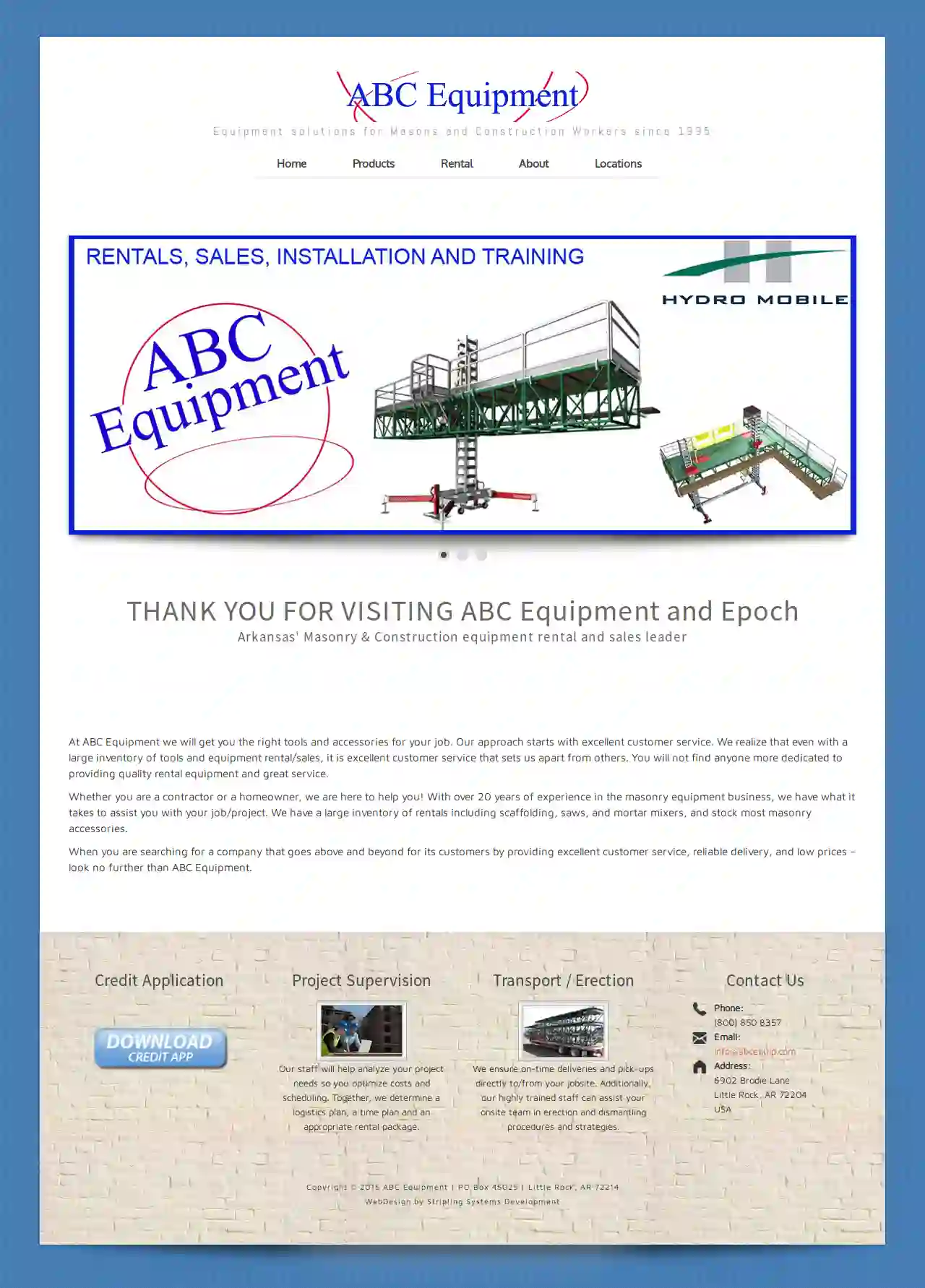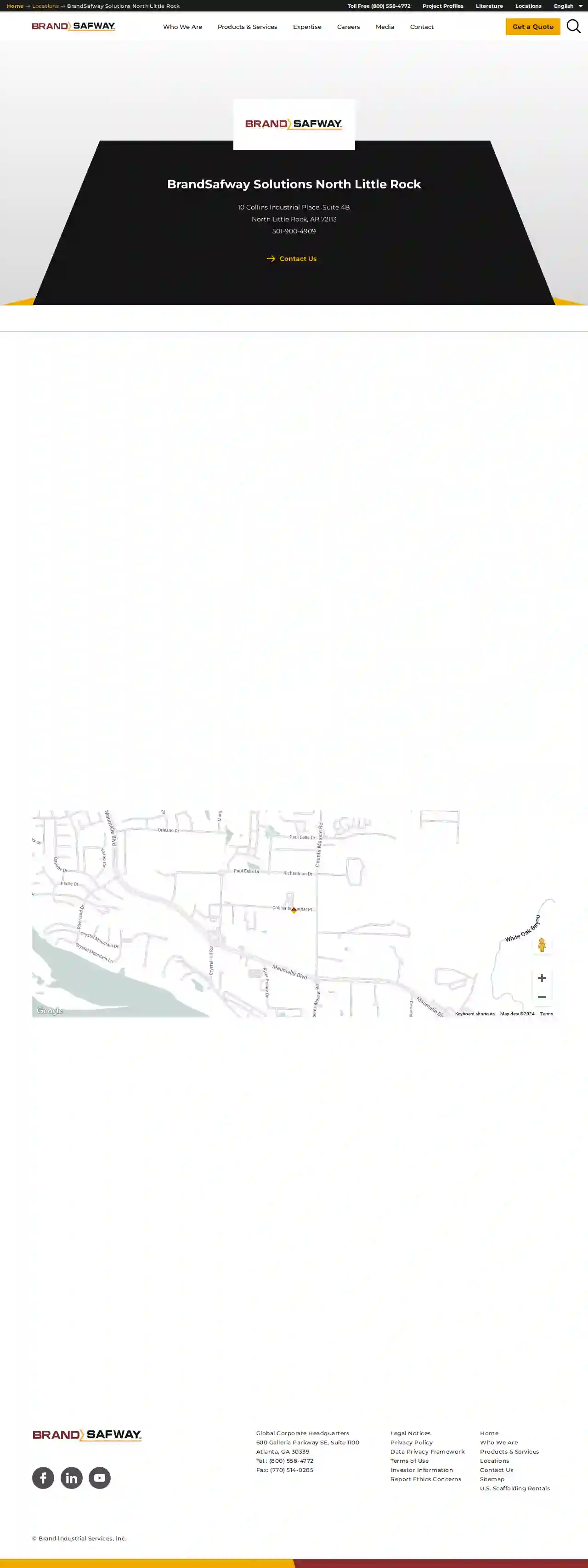Scaffolding Companies Haskell
Find the best Scaffolding Companies in Haskell
Get multiple Scaffolding Contractors quotes for your project today! Compare profiles, reviews, accreditations, portfolio, etc... and choose the best service.

ABC Equipment
4.19 reviews6902 Brodie Lane, Little Rock, 72204, USABC Equipment: Your Partner in Masonry & Construction Since 1995, ABC Equipment has been a trusted provider of equipment solutions for Masons and Construction Workers in Arkansas. We understand the importance of having the right tools for the job, and we're committed to providing our customers with the highest quality equipment and exceptional customer service. Our team is dedicated to helping you succeed. We offer a wide range of rental equipment, including scaffolding, saws, mortar mixers, and a variety of masonry accessories. We also provide project supervision, transportation, and erection services to ensure your project runs smoothly. Whether you're a seasoned contractor or a homeowner tackling a DIY project, ABC Equipment is here to support you. We're proud to offer competitive prices, reliable delivery, and a commitment to exceeding your expectations. We're more than just an equipment rental company; we're your partners in success. Contact us today to learn more about how we can help you achieve your project goals.
- Services
- Why Us?
- Gallery
Get Quote
BrandSafway Solutions North Little Rock
North Little Rock, AR, 1234 Industrial Blvd, 72118, USBrandSafway is a leading provider of access solutions, including scaffolding, aerial work platforms, and forming and shoring. With a strong commitment to safety, quality, and customer satisfaction, BrandSafway offers a wide range of services tailored to meet the unique needs of clients across various industries. Their team of experienced professionals is dedicated to delivering innovative solutions that enhance efficiency and productivity, ensuring successful project outcomes.
- Services
- Why Us?
- Accreditations
- Our Team
- Testimonials
Get Quote- Un
Universal Scaffolding & Equipment
4.33 reviewsLittle Rock, US- Services
- Why Us?
Get Quote - Un
Universal Dock & Door
Little Rock, US- Services
- Why Us?
Get Quote
Over 2,353+ Scaffolding Businesses on our directory
Our scaffolding pros operate in Haskell and beyond!
ScaffoldingHQ has curated and vetted the Best Scaffolding Businesses in Haskell. Find a top & reliable contractor today.
Frequently Asked Questions About Scaffolding Companies
- Size and Complexity: Larger, more intricate scaffolding structures will naturally take longer to assemble.
- Scaffolding Type: System scaffolding, with its pre-engineered components, can be erected faster than traditional tube and clamp scaffolding.
- Accessibility: Difficult site access or limited working space can prolong the erection process.
- Crew Size and Experience: The number and skill level of the scaffolding erectors will impact the speed of assembly.
- Work at Height Regulations 2005: Covers all work at height and outlines the need for risk assessments, competent erectors, and safe equipment.
- Construction (Design and Management) Regulations 2015 (CDM): Applies to construction projects and requires planning for scaffolding safety throughout the project lifecycle.
- British Standard BS EN 12811: Sets standards for the design, manufacture, and testing of scaffolding components.
- NASC (National Access & Scaffolding Confederation) Guidance: Provides industry best practices and safety recommendations for scaffolding.
- Communicate with the Scaffolding Company: Clearly express your concerns about potential damage to landscaping, structures, or utilities.
- Clear the Area: Remove any valuable or fragile items from the work zone.
- Protect Landscaping: Cover plants, shrubs, and lawns with tarps or protective sheeting.
- Mark Underground Utilities: Ensure underground utilities (water lines, electrical cables) are marked and avoided during installation.
- Supervision: If possible, be present during erection and dismantling to monitor the process.
- Always Wear a Safety Harness: Connect your harness to a secure anchor point at all times to prevent falls.
- Keep Platforms Clear: Remove tools, materials, and debris to avoid tripping hazards.
- Never Overload the Scaffolding: Stay within the designated weight limits.
- Be Aware of Your Surroundings: Pay attention to power lines, moving equipment, and other potential hazards.
- Inspect Before Use: Check the scaffolding for any damage or defects before starting work.
- Communicate Clearly: Use hand signals and clear communication to coordinate with other workers.
- Follow Safety Training: Attend and understand all safety training provided by your employer or the scaffolding company.
How long does it take to erect scaffolding?
What are the safety regulations for scaffolding in the USA?
How do I protect my property from damage during scaffolding erection and dismantling?
What are some tips for working safely on scaffolding?
How long does it take to erect scaffolding?
- Size and Complexity: Larger, more intricate scaffolding structures will naturally take longer to assemble.
- Scaffolding Type: System scaffolding, with its pre-engineered components, can be erected faster than traditional tube and clamp scaffolding.
- Accessibility: Difficult site access or limited working space can prolong the erection process.
- Crew Size and Experience: The number and skill level of the scaffolding erectors will impact the speed of assembly.
What are the safety regulations for scaffolding in the USA?
- Work at Height Regulations 2005: Covers all work at height and outlines the need for risk assessments, competent erectors, and safe equipment.
- Construction (Design and Management) Regulations 2015 (CDM): Applies to construction projects and requires planning for scaffolding safety throughout the project lifecycle.
- British Standard BS EN 12811: Sets standards for the design, manufacture, and testing of scaffolding components.
- NASC (National Access & Scaffolding Confederation) Guidance: Provides industry best practices and safety recommendations for scaffolding.
How do I protect my property from damage during scaffolding erection and dismantling?
- Communicate with the Scaffolding Company: Clearly express your concerns about potential damage to landscaping, structures, or utilities.
- Clear the Area: Remove any valuable or fragile items from the work zone.
- Protect Landscaping: Cover plants, shrubs, and lawns with tarps or protective sheeting.
- Mark Underground Utilities: Ensure underground utilities (water lines, electrical cables) are marked and avoided during installation.
- Supervision: If possible, be present during erection and dismantling to monitor the process.
What are some tips for working safely on scaffolding?
- Always Wear a Safety Harness: Connect your harness to a secure anchor point at all times to prevent falls.
- Keep Platforms Clear: Remove tools, materials, and debris to avoid tripping hazards.
- Never Overload the Scaffolding: Stay within the designated weight limits.
- Be Aware of Your Surroundings: Pay attention to power lines, moving equipment, and other potential hazards.
- Inspect Before Use: Check the scaffolding for any damage or defects before starting work.
- Communicate Clearly: Use hand signals and clear communication to coordinate with other workers.
- Follow Safety Training: Attend and understand all safety training provided by your employer or the scaffolding company.